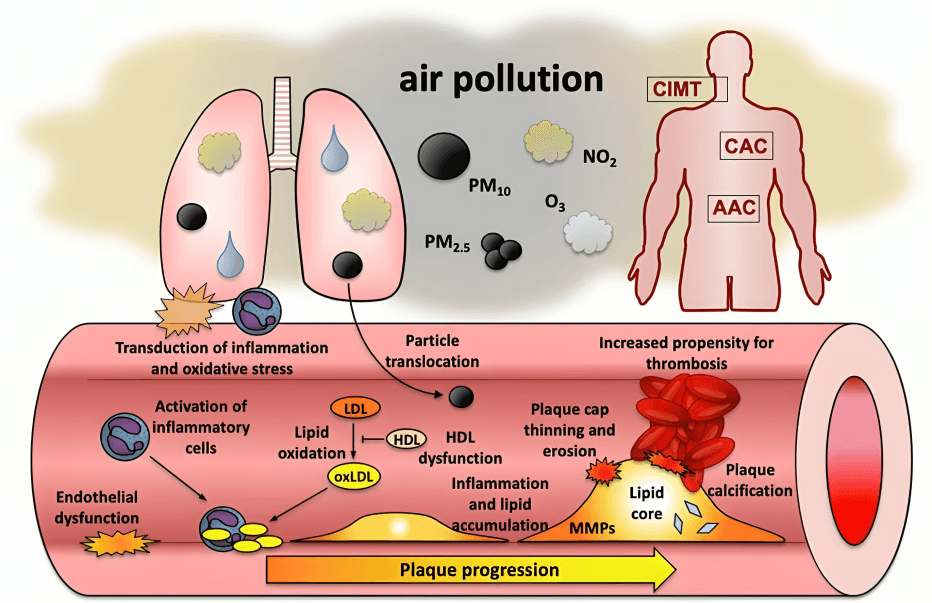
“
Understanding the common risk factors for heart attacks is essential for preventing one of the world's leading causes of death. Heart attacks, or myocardial infarctions, result from blocked blood flow to the heart, usually due to plaque buildup in the arteries. While genetics play a role, most contributing factors are related to lifestyle, health conditions, or environmental influences. 1
1
”
Greek physician Hippocrates noted that emotions, food, and environment affect health, foreshadowing today’s understanding that stress, poor diet, and pollution are major risk factors for heart attacks.1
High blood pressure silently damages arterial walls over time, making it one of the most common risk factors for heart attacks, even in people who feel perfectly healthy otherwise. 2

Smoking tobacco increases heart attack risk by damaging blood vessels, lowering oxygen levels, and raising blood pressure, all of which stress the cardiovascular system and accelerate artery-clogging plaque.
High levels of low-density lipoprotein (LDL) cholesterol contribute to fatty deposits in the arteries, which can rupture and form clots, triggering a heart attack without prior symptoms.3
Diabetes, particularly when poorly managed, increases heart attack risk due to elevated blood sugar that damages blood vessels and promotes inflammation in coronary arteries over time.4
A sedentary lifestyle reduces circulation, weakens the heart, and contributes to obesity and high cholesterol, all of which multiply the risk of experiencing a heart attack in adulthood. 5
Obesity doesn’t just affect appearance—it increases strain on the heart, boosts blood pressure, worsens cholesterol levels, and often leads to metabolic conditions like diabetes, all heart-threatening. 6
Chronic stress releases hormones like cortisol and adrenaline, which elevate heart rate and blood pressure, damaging blood vessels and increasing the likelihood of a heart attack over time. 7
Excessive alcohol intake can raise blood pressure and triglyceride levels, contributing to arterial plaque buildup, which can block coronary arteries and provoke sudden heart attacks. 8
Family history of heart disease raises your risk significantly. If close relatives had heart attacks early in life, your genetic makeup might include predispositions to similar conditions. 9

Poor diet, especially one high in saturated fats, trans fats, and sugars, promotes obesity, high cholesterol, and insulin resistance—all critical contributors to heart attacks.
Lack of sleep affects hormonal balance, increases blood pressure, and raises stress levels. These disturbances impair the heart’s ability to function and repair, raising heart attack risk. 10
Inflammatory diseases like lupus or rheumatoid arthritis elevate heart attack risk by triggering chronic inflammation that damages the lining of blood vessels and accelerates plaque formation. 11

Air pollution, especially from traffic and industrial areas, can lead to long-term cardiovascular damage by inflaming blood vessels and promoting the development of arterial blockages.
Secondhand smoke exposure is almost as harmful as direct smoking, raising heart attack risk by introducing harmful chemicals that damage arteries and increase clot formation. 12
Men are statistically more likely to have heart attacks earlier in life than women, though women’s risk increases sharply after menopause due to the drop in protective estrogen levels. 13
Elevated triglyceride levels in the blood, especially when combined with high LDL or low HDL cholesterol, contribute significantly to the formation of plaque in coronary arteries. 14
Depression and anxiety are closely linked to heart attack risk. Emotional distress can alter heart rhythm, increase blood pressure, and encourage unhealthy behaviors like overeating or smoking.15
Poor oral health, especially gum disease, increases heart attack risk, as bacteria from infected gums can enter the bloodstream, triggering inflammation in the coronary arteries. 16
Overuse of non-steroidal anti-inflammatory drugs (NSAIDs), like ibuprofen, can raise blood pressure and disrupt heart rhythms, contributing to an increased chance of heart attack with long-term misuse. 17


